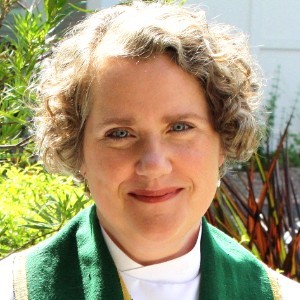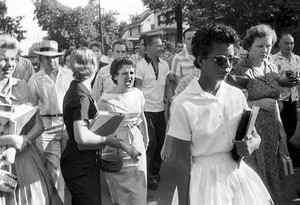 Travis and I carpooled to high school for three years. It was the 1990s when grunge was the look for white people. Travis was, and still is, an amazing dresser. He did not hold back on his opinion of my jeans with holes in the knees or my flannel shirts and muddy hiking boots.
Travis and I carpooled to high school for three years. It was the 1990s when grunge was the look for white people. Travis was, and still is, an amazing dresser. He did not hold back on his opinion of my jeans with holes in the knees or my flannel shirts and muddy hiking boots.
“Girl,” he would say when I arrived at his house, “where you think we live? You are going to downtown Nashville, not the farm.” Travis wore white jeans with a white shirt and white jacket. Next to his dark brown skin, the effect was stunning.
“We’ve been lying to ourselves about who we really are.”
We haven’t seen each other in years, but Travis is one of my favorite Facebook friends. Recently he posted a picture of Elizabeth Eckford on her first day at Little Rock Central High School in 1957. Eckford was one of the Little Rock Nine who famously integrated the previously all-white public school.
Travis, who is now a published poet, a lawyer and a professor, noted that he sees pictures like this one every February, often accompanied by a story about the black person in the photo – about their life, what they endured and the sacrifice and bravery recorded in that historic moment. He added this:
“What is almost never talked about though are the other people. As if they somehow ceased to exist. As if the person opposed to integration and equality, the person spitting, hitting, slur slinging, releasing a dog disappeared at some point and was replaced by a smarter, more tolerant, accepting community.
“That wasn’t true. We’ve been lying to ourselves about who we are. That’s why and how we keep being surprised and caught off guard by white supremacy when it emerges. The country that took military intervention in its own borders just to allow black kids to go to school with white kids a generation or two ago simply must have work to do.
“The angry folks in this photo weren’t and aren’t fringe. They were the middle. The average. They had jobs and families. Raised kids and defended those values. They endured too. So when I consider those fighters in these photos now, it’s not with nostalgia. It’s for guidance.”
Travis is right. We’ve been lying to ourselves about who we really are. We’ve glossed over. We’ve replaced extreme and overt racist language with words like “welfare queen,” “crackhead,” “thug” or more subtle, coded but still-racist phrases.
In the Sermon on the Mount, Jesus says:
“So when you are offering your gift at the altar, if you remember that your brother or sister has something against you, leave your gift there before the altar and go; first be reconciled to your brother or sister, and then come and offer your gift” (Matthew 5:23-24, NRSV).
We have not done this work of reconciliation. There is blood on our hands – Native American blood, African American blood, Queer blood, Jewish and Muslim blood, Immigrant blood. Generation after generation we bring our gifts to the altar, never stopping to do the work of reconciliation.
“No bandages can cover the fact that Rush Limbaugh was recently awarded the presidential medal of freedom.”
Our sins haunt us. They have become part of how we see the world. We are stuck in a seemingly endless cycle of racism and violence – a cycle that will repeat over and over unless we do the work of reconciliation. We cannot continue to pretend that time will heal the deep wounds that divide us.
Archbishop Desmond Tutu, now 88, has devoted his life to truth and reconciliation. He has written books and articles and given countless media interviews. He worked closely with Nelson Mandela to help South Africa move toward reconciliation after apartheid, including serving as chairman of the Truth and Reconciliation Commission. For Tutu, “Forgiving and being reconciled to our enemies or our loved ones is not about pretending that things are other than they are.”
Tutu clung to the belief, shared by many, that to forget the past is to be doomed to repeat it. Thus, he believed there was no path forward without disclosure, without dealing with the past. “It is not dealing with the past to say glibly, ‘Let bygones be bygones,’” he said, “for then they will never be bygones.”
Tutu and other commission members required full disclosure before granting amnesty. Only then, they thought, would the process of requesting and receiving forgiveness be healing and transformative for all involved. They found that unearthing the truth was no less necessary and powerful for the victims’ healing than it was for the perpetrators’. Guilt, even unacknowledged guilt, has a negative effect and will always come out in one way or another.
They realized it was necessary to “go to the root, remove that which is festering, cleanse and cauterize, and then a new beginning is possible…. Superficial reconciliation can bring only superficial healing.”
Meanwhile, many white Americans continue to turn a blind eye to racial injustice. We’ve settled for superficial healing at best and lies at worst. We are a wounded people – wounded especially by white supremacy. Our wound has been ignored and covered over. And it continues to fester.
“We are stuck in a seemingly endless cycle of racism and violence.”
No bandages can cover the fact that Rush Limbaugh was recently awarded the presidential medal of freedom by President Donald Trump while a decorated Tuskegee airman sat mere feet away. For decades Limbaugh has exploited talk radio to spew hatred toward African American people, LGBTQ+ people, women, Native Americans, immigrants and others for decades. Honoring him wasn’t an accident or an oversight; it is a reflection of a set of values that, to our country’s shame, have not changed. Perhaps they became less public in some communities, but because they were never confronted, they never really changed.
Children are being separated from their parents at our borders, an atrocity that continues (once news media coverage has moved on to other moral and political crises generated by the Trump administration). Human beings are being held in cages or being sent back to the deadly situations they risked everything to flee. The rights of LGBTQ+ people continue to be stripped away. Protections of the earth – its water, air and forests – are systemically being removed, often under the cover of innumerable distractions created by the latest tweets from the White House, attacks on political opponents and endless lies, distortions and exaggerations.
More U.S. service veterans have taken their own lives through suicide in the last decade than were killed in Vietnam. Shootings continue in our schools, our churches and shopping malls.
We’ve been lying to ourselves about who we are. We’ve been trying to move forward without facing hard truths.
As Tutu has repeatedly stressed, there can never be real reconciliation without confrontation. The process for reconciliation, he suggests, is this: “telling the story, naming the hurt, granting forgiveness and renewing or releasing the relationship.”
Storytelling is vital – and not just the telling, but also the listening. Each story may need to be told again and again. In every case, it needs to be spoken in safety and heard with empathy.
Naming the hurt means it is not enough to simply keep going, to gloss over, to pretend nothing happened. Naming the hurt means confrontation. It means doing the work of seeing and acknowledging the hurt.
“Reconciliation does not subvert justice; it does not mean forgetting.”
Next, granting forgiveness means getting to the place where we see the perpetrator’s shared humanity. We can forgive when we can see the other person’s pain and confusion and release any need for retribution.
Tutu’s final step of reconciliation is renewing or releasing the relationship. Sometimes a relationship cannot be renewed. (Jesus did not ask us to leave our gift at the altar and return to an abusive relationship). Sometimes, after we’ve shared our story, named the hurt and done the work of forgiveness, a new relationship can be created. The new relationship doesn’t pretend nothing happened. It is not founded on lies. Reconciliation does not subvert justice; it does not mean forgetting.
The white woman behind Elizabeth Eckford in the photo, her face contorted in rage, is Hazel Bryan. She is screaming, “Go back to Africa.” We must stop pretending that things like this don’t happen anymore; that that was then, and this is now, and things have changed. Turn on the news, eavesdrop at a playground or at a restaurant; pay attention and you will hear every day the sounds of hate and exclusion.

September 4, 1957, Elizabeth Eckford – one of nine black students attempting to attend Central High School, in Little Rock, Arkansas – is met with jeers.
Eckford was silent about her suffering. For years she did not talk about the suffering from that historic day or the torment that continued day after day for the entire school year as her fellow students called out for her to be lynched, as they spat on her, punched her, threw eggs and vegetables at her, yelled slurs and insults.
In 1997, Will Counts, the news photographer who captured the image that Travis posted on his Facebook page, arranged for these two women to meet. Hazel told Elizabeth that she was sorry. They posed for a picture side by side in front of Little Rock Central High School. The photo became a popular poster, with the word “reconciliation” printed at the bottom.
The pair even attended a few events and seminars together. But they did not achieve true reconciliation. Eckford said, “True reconciliation can occur only when we honestly acknowledge our painful, but shared past.”
We still have work to do. Honestly acknowledging the past and the present, seeing what white supremacy has done and is doing to our world and to our lives, we can tell the stories we need to tell, and we can listen to the stories that need to be voiced. We can acknowledge the hurt, the suffering, the abuse. We can offer our apologies. We can offer forgiveness and truly seek to make amends. We can renew relationships or release them.
What we cannot do is keep lying to ourselves. What we cannot do is nothing.
